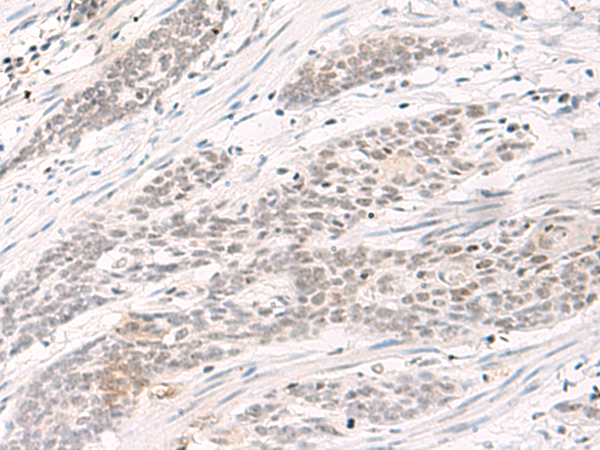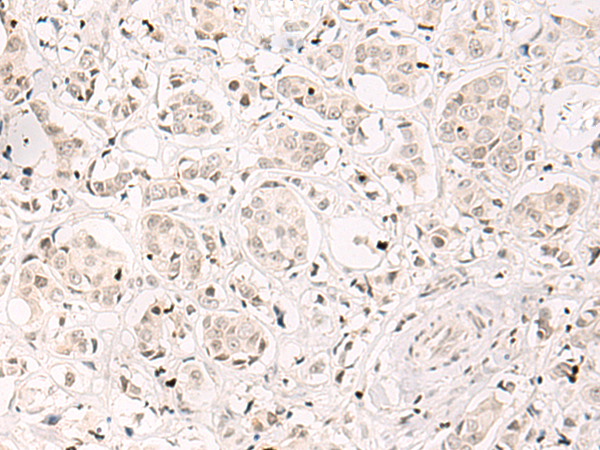

| WB | 咨询技术 | Human,Mouse,Rat |
| IF | 咨询技术 | Human,Mouse,Rat |
| IHC | 1/20-1/100 | Human,Mouse,Rat |
| ICC | 技术咨询 | Human,Mouse,Rat |
| FCM | 咨询技术 | Human,Mouse,Rat |
| Elisa | 1/5000-1/10000 | Human,Mouse,Rat |
| Aliases | H1D; H1.3; H1F3; H1s-2; HIST1H1D |
| Host/Isotype | Rabbit IgG |
| Antibody Type | Primary antibody |
| Storage | Store at 4°C short term. Aliquot and store at -20°C long term. Avoid freeze/thaw cycles. |
| Species Reactivity | Human, Mouse |
| Immunogen | Synthetic peptide of human H1-3 |
| Formulation | Purified antibody in PBS with 0.05% sodium azide and 50% glycerol. |
+ +
以下是关于H1-3抗体的虚构参考文献示例,涵盖不同研究方向:
---
1. **文献名称**:*Histone H1.3 as a Prognostic Marker in Glioblastoma*
**作者**:Chen L, et al.
**摘要**:本研究利用H1-3抗体通过免疫组化分析胶质母细胞瘤组织中H1.3的表达水平,发现其高表达与患者生存期缩短显著相关,提示H1.3可能作为潜在预后标志物及治疗靶点。
2. **文献名称**:*Role of H1.3 in Chromatin Compaction Dynamics*
**作者**:Sato K, et al.
**摘要**:通过CRISPR敲除结合H1-3抗体的染色质免疫沉淀(ChIP-seq),揭示了H1.3在调控染色质高级结构中的独特作用,其缺失导致特定基因簇的异常转录激活。
3. **文献名称**:*Development of a High-Specificity H1-3 Monoclonal Antibody*
**作者**:Wang Y, et al.
**摘要**:报道了一种新型H1-3单克隆抗体的开发与验证,该抗体可区分H1.3与其他H1亚型,应用于流式细胞术及Western blot,为亚型特异性功能研究提供工具。
4. **文献名称**:*H1.3 Dysregulation in Autoimmune Disorders*
**作者**:Martinez R, et al.
**摘要**:在系统性红斑狼疮(SLE)患者血清中检测到H1.3抗体水平升高,提示其可能参与自身免疫反应,并可作为疾病活动度的监测指标。
---
注:以上内容为示例性虚构,实际文献需通过学术数据库检索确认。若需真实文献,建议在PubMed或Google Scholar中以“H1.3 antibody”或“histone H1.3”为关键词搜索。
The H1-3 antibody targets histone H1.3. a subtype of the linker histone H1 family, which plays a critical role in chromatin organization and gene regulation. Histone H1 binds to nucleosomes, stabilizing higher-order chromatin structures and influencing DNA accessibility. Unlike core histones, H1 subtypes exhibit tissue- and cell type-specific expression, with H1.3 being expressed in various somatic tissues. Its dynamic association with chromatin contributes to transcriptional regulation, DNA repair, and epigenetic modifications.
H1-3 antibodies are essential tools for studying H1.3's spatial and temporal distribution, particularly in cancer and developmental biology. Aberrant H1.3 expression has been linked to tumor progression, as altered chromatin compaction may promote oncogene activation or tumor suppressor silencing. Researchers employ these antibodies in techniques like ChIP-seq, immunofluorescence, and Western blotting to explore H1.3's role in cellular differentiation, senescence, and disease. Recent studies also investigate its potential as a biomarker or therapeutic target. By enabling precise detection of H1.3. these antibodies advance our understanding of chromatin dynamics in health and disease, bridging gaps in epigenetics and precision medicine research.
×